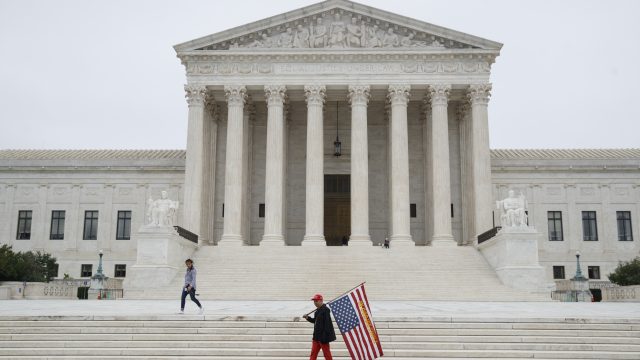U.S. Supreme Court Decision Could Mean Big Changes for North Dakota Bar Association

A demonstrator outside the Supreme Court building, on Capitol Hill in Washington, Oct. 6, 2018. The full Senate was set for a final vote on Judge Brett Kavanaugh's nomination later Saturday, possibly concluding the most tumultuous Supreme Court confirmation process in decades. (Tom Brenner/The New York Times)
Lawyers in the State of North Dakota pay dues to what’s called an integrated bar.
The State Bar Association of North Dakota is both the official regulatory body for the legal industry in our state, administering the licensing and discipline of lawyers who work in our state, and an advocacy group for the legal industry.
As you might imagine, this is a little problematic, because like any group of people lawyers have diverse viewpoints when it comes to politics and public policy.
[mks_pullquote align=”left” width=”300″ size=”24″ bg_color=”#ffffff” txt_color=”#000000″]Janus requires that nobody be forced into unwanted associations as a price for earning a living.[/mks_pullquote]
This became an issue during the 2014 election cycle when SBAND spent a significant amount of money opposing a ballot measure aimed at reform state custody laws (supporters referred to it as the “shared parenting” measure). Many lawyers objected, arguing that the fees they’re required to pay to operate as lawyers in our state were being used in pursuit of political positions they didn’t support.
One attorney, Arnold Fleck of Bismarck, filed a lawsuit and just recently got something of a victory from the U.S. Supreme Court.
After seeing his suit dismissed by the 8th Circuit Court of Appeals last year, Flecked appealed to SCOTUS which vacated the 8th Circuit’s ruling and remanded the case for reconsideration under the brand new Janus v. State, County, and Municipal Employees precedent.
The Janus ruling deals with some state laws which allowed unions (particularly public worker unions) to collect dues even from people who did not want to be a member of the union. The Supreme Court, rightly, found that situation to be unconstitutional.
Could that help Fleck’s case against SBAND? Janus requires that nobody be forced into unwanted associations as a price for earning a living. The question is going to be whether or not SBAND, in the view of the courts, has provided (or even can provide) enough separation between its political activities and its function as an official licensing group to which lawyers must pay fees by law.
Which may have implications for other groups in North Dakota. There is a laundry list of organizations in our state – groups that oversee professionals like doctors, etc. – which act not only in an official licensing capacity but also engage in political activities as well.
That shouldn’t be. Licensing groups should administer licensing, and that’s it. If a given profession like lawyers or doctors or anyone else wants to organize in pursuit of political objectives, they should form separate groups privately.




